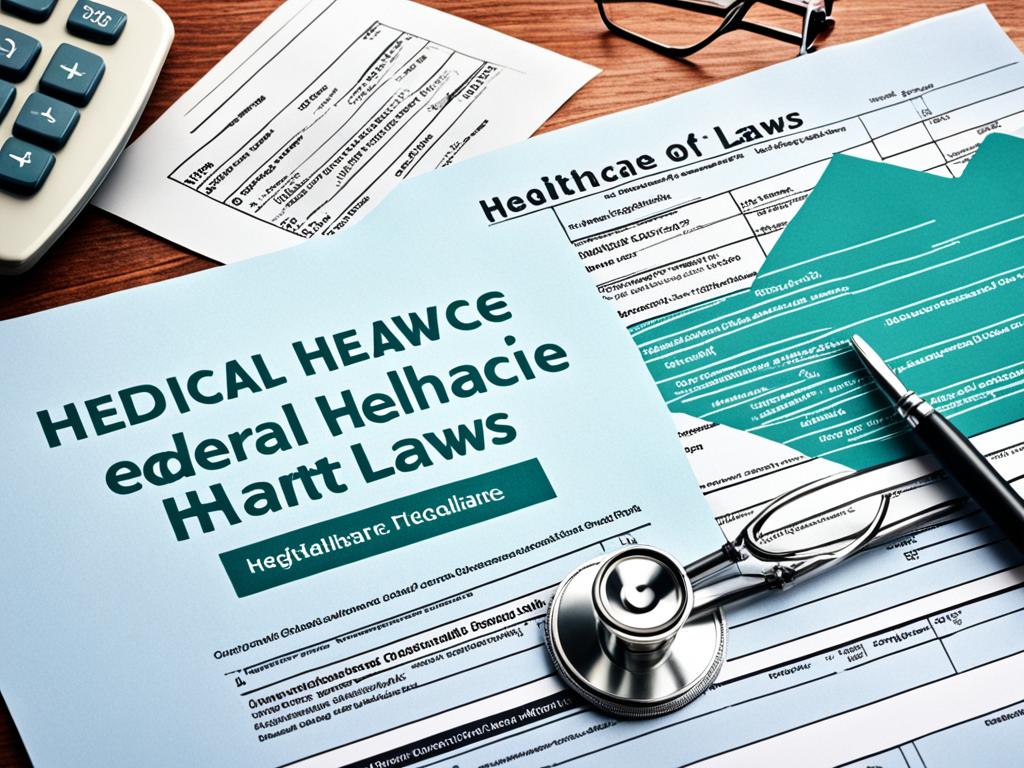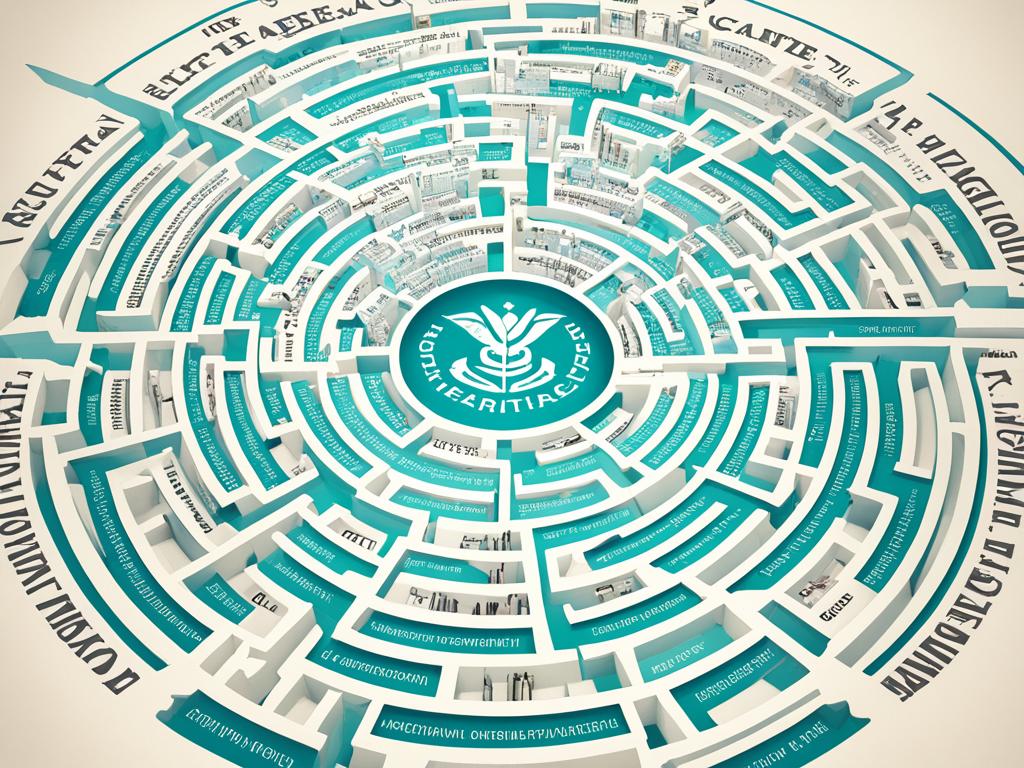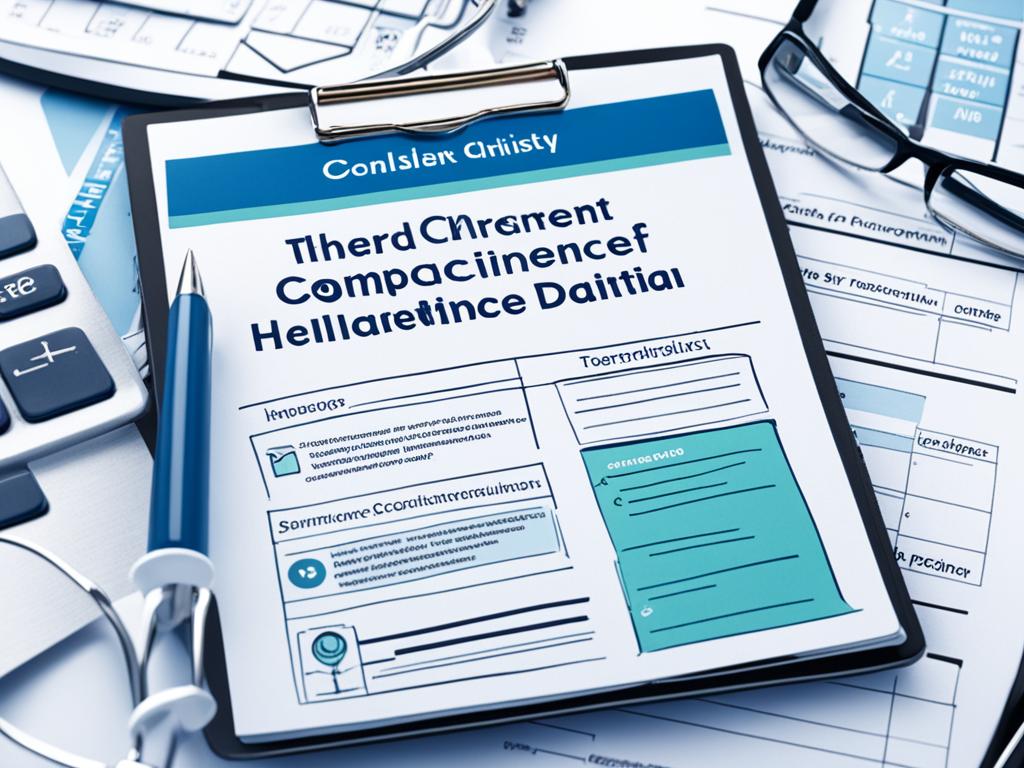Healthcare organizations must navigate a complex web of legal aspects of healthcare and healthcare regulations to ensure patient safety, protect their rights, and maintain operational integrity. This article will explore the key legal issues impacting healthcare, best practices for healthcare compliance, and strategies for building a culture of compliance. From HIPAA compliance and informed consent to medical malpractice and healthcare fraud prevention, healthcare providers must vigilantly adhere to a multitude of state and federal laws. Effective compliance programs, clear institutional policies, and ongoing staff training are essential for mitigating risks and upholding the highest standards of medical ethics.
Key Takeaways
- Healthcare organizations face a complex legal and regulatory landscape that demands vigilance and a comprehensive approach to compliance.
- Compliance with HIPAA regulations, informed consent protocols, and prevention of medical malpractice and healthcare fraud are critical for patient safety and organizational integrity.
- Effective compliance programs, clear institutional policies, and ongoing staff training are essential for mitigating legal risks and maintaining the highest standards of ethical care.
- Adherence to state and federal healthcare laws, including nurse practice acts and scope of nursing practice, is crucial for healthcare providers.
- Building a culture of compliance, with strong communication and continuous improvement, is key to ensuring sustainable legal compliance in healthcare organizations.
Introduction to Legal Compliance in Healthcare
Navigating the complex legal and regulatory landscape of the healthcare industry is a critical responsibility for healthcare providers, administrators, and organizations. Healthcare compliance refers to the observance and adherence to the laws, regulations, and ethical standards that guide and govern healthcare practices. Maintaining compliance is vital for ensuring patient safety, protecting the rights and reputations of healthcare professionals, and upholding the integrity of healthcare institutions.
Importance of Compliance for Patient Safety and Organizational Integrity
At the heart of healthcare legal compliance is the imperative to safeguard patient wellbeing and preserve public trust in the medical system. By strictly adhering to healthcare laws and regulations, such as the Health Insurance Portability and Accountability Act (HIPAA) and medical licensing requirements, healthcare organizations can mitigate risks, prevent medical errors, and deliver consistently high-quality, ethical care. Compliance also helps protect the rights and privacy of patients and reinforces the professional medical ethics standards expected of healthcare providers.
Overview of Legal and Regulatory Frameworks
The legal and regulatory environment governing healthcare is multifaceted, encompassing a diverse array of state and federal laws, industry guidelines, and professional codes of conduct. Healthcare organizations must navigate this complex web of requirements, which span areas such as patient rights and privacy, HIPAA guidelines, medical malpractice prevention, and healthcare fraud prevention. Maintaining compliance across this broad spectrum is essential for preserving the integrity and reputation of healthcare institutions.
State and Federal Laws Governing Healthcare
Nurses are bound by and must comply with the healthcare laws and regulations at both state and federal levels. The primary regulation of nurses is the Nurse Practice Act, which varies by state and outlines the scope of nursing practice, requirements for licensure, and standards for professional conduct.
Nurse Practice Acts and Scope of Nursing Practice
The Nurse Practice Act is the foundational legislation that defines the legal scope of nursing practice within each state. This act establishes the educational and licensing requirements for nurses, delineates the roles and responsibilities of different nursing designations, and sets the professional standards that all nurses must uphold. Adhering to the Nurse Practice Act is essential for ensuring patient safety and maintaining the integrity of the nursing profession.
Federal Regulations: HIPAA, EMTALA, and More
In addition to state-level regulations, nurses must also comply with a range of federal healthcare laws, including the Health Insurance Portability and Accountability Act (HIPAA) and the Emergency Medical Treatment and Active Labor Act (EMTALA). HIPAA governs the protection of patient privacy and the confidentiality of protected health information (PHI), while EMTALA mandates that all patients receive stabilizing emergency medical care, regardless of their insurance status or ability to pay.
Other key federal regulations that impact nursing practice include the Controlled Substances Act, which regulates the handling and dispensing of medications, and the Occupational Safety and Health Administration (OSHA) standards, which outline safety protocols for healthcare workers. Maintaining compliance with these varied federal laws is essential for delivering high-quality, ethical, and legally sound patient care.

Institutional Policies and Procedures
Healthcare organizations, whether hospitals, clinics, or physician’s offices, establish comprehensive healthcare policies and procedures that nurses and other staff must adhere to. These institutional guidelines are designed to ensure legal compliance in healthcare and promote consistent patient care across the organization.
Aligning with Legal Standards and Ensuring Consistent Care
The primary purpose of these policies and procedures is to align the organization’s operations with the relevant state and federal laws, regulations, and ethical standards governing the healthcare industry. By establishing clear, consistent protocols, healthcare institutions can mitigate legal risks, protect patient rights, and deliver a high level of care that meets or exceeds industry benchmarks.
Nurses play a crucial role in upholding these institutional policies and procedures, which cover a wide range of areas, from patient privacy and medication administration to incident reporting and professional conduct. By consistently following these guidelines, nurses can help ensure that patients receive consistent patient care and that the organization maintains legal compliance in healthcare.
| Key Elements of Institutional Policies and Procedures | Description |
|---|---|
| Healthcare policies and procedures | Comprehensive guidelines that outline the organization’s practices and expectations for employees, with a focus on legal compliance in healthcare and consistent patient care. |
| Compliance with state and federal laws | Policies and procedures are designed to ensure the organization adheres to all relevant healthcare laws and regulations, mitigating legal risks. |
| Patient privacy and confidentiality | Protocols for protecting patient information, including compliance with HIPAA and other privacy laws. |
| Medication administration and management | Procedures for the safe and accurate handling, distribution, and documentation of medications. |
| Incident reporting and response | Guidelines for addressing and documenting adverse events, errors, or other incidents that may impact patient care or the organization’s compliance. |
By aligning institutional policies and procedures with legal standards and best practices, healthcare organizations can foster a culture of consistent patient care and legal compliance in healthcare, ensuring the delivery of safe, ethical, and high-quality care to the communities they serve.
Patient Rights and Privacy Protections
Patients entrust healthcare providers with sensitive personal and medical information, placing them in a vulnerable position. To safeguard patient rights and protect health information, vital regulations like the Health Insurance Portability and Accountability Act (HIPAA) have been enacted. HIPAA’s primary objective is to ensure the confidentiality of protected health information (PHI) and empower patients to make informed decisions about their care.
HIPAA Compliance and PHI Confidentiality
HIPAA’s stringent guidelines mandate that healthcare organizations implement robust data security measures and strictly limit access to PHI. Nurses play a crucial role in upholding HIPAA compliance, as they regularly handle sensitive patient information. Failing to safeguard PHI can result in significant penalties and undermine patient trust, making HIPAA compliance a top priority.
Informed Consent and Reproductive Health Considerations
Another essential aspect of patient rights is the principle of informed consent. Patients have the right to make autonomous decisions about their care, which includes understanding the potential risks, benefits, and alternatives of any proposed treatment or procedure. This is particularly crucial in the realm of reproductive healthcare, where patients must be empowered to make informed choices about their bodies and healthcare options.

Medication Administration and Management
Medication administration is a critical aspect of nursing practice, where medication administration, preventing medication errors, and accurate medical documentation are paramount to ensuring healthcare compliance. Nurses are often the primary caregivers responsible for properly handling, administering, and documenting patients’ medications, making this a highly sensitive area of legal and regulatory oversight.
Preventing Medication Errors and Misuse
Medication errors can have severe consequences, ranging from adverse patient outcomes to potential legal liabilities for healthcare providers. Nurses must be vigilant in verifying medication orders, dosages, and patient information to prevent such errors. Additionally, they must be attentive to the potential for medication misuse, theft, or diversion within the healthcare setting, and report any suspicious activities to the appropriate authorities.
Accurate Documentation and Reporting
Precise and thorough documentation of medication administration is crucial for maintaining accurate medical documentation and demonstrating healthcare compliance. Nurses must meticulously record the medication name, dosage, route, time of administration, and any patient responses or adverse effects. Timely and accurate reporting of medication-related incidents or concerns is also essential to mitigate risks and address potential issues effectively.
https://www.youtube.com/watch?v=jKPqP3vImpc
| Key Considerations for Medication Administration and Management | Best Practices |
|---|---|
| Verifying Medication Orders and Patient Information | Carefully cross-checking medication orders, dosages, and patient identifiers to prevent errors |
| Proper Handling and Storage of Medications | Ensuring secure storage, temperature control, and adherence to handling protocols |
| Timely and Accurate Documentation | Meticulous recording of medication details, patient responses, and any incidents or concerns |
| Monitoring for Medication Misuse or Diversion | Vigilance in identifying and reporting suspicious activities to maintain patient safety and healthcare compliance |
Legal Aspects of Healthcare
Healthcare organizations must navigate a complex web of
healthcare laws and regulations
to ensure patient safety, protect their rights, and maintain operational integrity. From
medical malpractice
and
healthcare liability
concerns to
healthcare fraud prevention
, providers must vigilantly adhere to a multitude of state and federal laws.
Healthcare Laws and Regulations
Nurses have a great deal of responsibility in health systems, including accurate and timely documentation of charts and other written reports, adherence to professional and ethical standards, and reporting and responding to incidents, such as accidents, errors in medication, or patient neglect, abuse, or any other unsafe nursing or medical practices.
Medical Malpractice and Liability Concerns
Healthcare providers, including nurses, must be aware of the legal implications of their actions and decisions. Medical malpractice and healthcare liability are critical concerns that can result in costly lawsuits and damage to professional reputations. Nurses must exercise due diligence, follow established protocols, and document all patient interactions to mitigate these risks.
Healthcare Fraud Prevention
In addition to patient care, nurses must also be vigilant in identifying and reporting any suspected healthcare fraud. This can include billing irregularities, misuse of medical resources, or other fraudulent activities that undermine the integrity of the healthcare system. Nurses play a vital role in upholding ethical standards and protecting the healthcare industry from fraud and abuse.
| Legal Compliance Area | Key Considerations | Potential Consequences |
|---|---|---|
| Healthcare Laws and Regulations | Adherence to state and federal laws, documentation requirements, reporting of incidents | Fines, penalties, loss of licensure, reputational damage |
| Medical Malpractice and Liability | Following established protocols, exercising due diligence, thorough documentation | Lawsuits, financial liability, professional reputation harm |
| Healthcare Fraud Prevention | Identifying and reporting billing irregularities, misuse of resources, unethical practices | Fines, legal consequences, loss of public trust |

Professional and Ethical Standards
Nurses in the healthcare industry are bound by a comprehensive set of professional and ethical standards that guide their conduct and decision-making. These standards, established by organizations like the
American Nurses Association (ANA)
, ensure that
healthcare professional standards
,
medical ethics
, and the highest levels of patient care are upheld across the industry.
Codes of Ethics and Conduct
The ANA Code of Ethics for Nurses serves as the foundation for ethical nursing practice, outlining the principles and values that nurses must adhere to, such as respect for human dignity, advocacy for patient rights, and a commitment to professional integrity. Healthcare organizations often develop their own codes of conduct that align with these industry-wide ethical standards, further reinforcing the importance of medical ethics in daily practice.
Continuing Education and Licensure Requirements
Maintaining competency through continuing education is a critical aspect of legal compliance for healthcare professionals. Nurses must satisfy ongoing medical licensure requirements, including completing a specified number of continuing education hours, to ensure they remain current with evolving healthcare laws, technologies, and best practices. This commitment to lifelong learning helps nurses provide the highest quality of healthcare professional standards to their patients.
| Key Elements of Professional and Ethical Standards | Description |
|---|---|
| ANA Code of Ethics for Nurses | Outlines the fundamental principles and values that guide ethical nursing practice, such as respect for human dignity, advocacy, and professional integrity. |
| Organizational Codes of Conduct | Healthcare institutions develop their own codes of conduct that align with industry-wide ethical standards, reinforcing the importance of medical ethics within the organization. |
| Continuing Education Requirements | Nurses must complete a specified number of continuing education hours to maintain their medical licenses and stay current with evolving healthcare laws, technologies, and best practices. |
| Medical Licensure | Nurses are required to hold valid medical licenses, issued by state regulatory bodies, to practice legally and provide high-quality patient care. |
Incident Reporting and Response
In the healthcare industry, incident reporting and effective response protocols are critical for maintaining patient safety, addressing healthcare errors and abuse, and upholding the highest standards of compliance. Nurses play a pivotal role in this process, responsible for promptly documenting and escalating any incidents, such as medication errors, patient neglect, or other unsafe medical practices.
Addressing Errors, Abuse, and Unsafe Practices
Nurses must be vigilant in identifying and reporting any breaches in patient safety or healthcare compliance. This includes accurately documenting accidents, medication errors, instances of patient abuse or neglect, and other concerning incidents. By addressing these issues head-on, healthcare organizations can implement corrective measures, mitigate risks, and foster a culture of incident reporting and continuous improvement.
Whistleblower Protections and Encouragement
To empower nurses and other healthcare workers to come forward with reports of healthcare errors and abuse, robust whistleblower protections must be in place. Institutions should establish clear policies and procedures that safeguard the anonymity and job security of those who report misconduct, while also actively encouraging a speak-up culture that prioritizes healthcare compliance and patient wellbeing.

Best Practices for Legal Compliance
To ensure effective
, healthcare organizations must prioritize building a , providing comprehensive , and implementing continuous monitoring and improvement measures.
Building a Culture of Compliance
Fostering a culture of is crucial for healthcare providers. This involves creating strategies to manage the stress and emotional toll associated with maintaining compliance, while also encouraging continuous education. By reminding nurses and staff of the high value of staying updated with the latest , organizations can empower their teams to uphold the highest standards of legal compliance.
Effective Communication and Training
Effective and open communication are essential for driving a culture of in healthcare. Regular training sessions should address the crucial role of communication in legal compliance, equipping staff with the knowledge and skills to navigate complex regulatory requirements. Additionally, healthcare organizations should foster a supportive work environment that prioritizes transparent communication and collaboration among all team members.
Continuous Monitoring and Improvement
Maintaining legal compliance is an ongoing process that requires continuous monitoring and improvement. Healthcare providers should implement robust systems for tracking compliance metrics, benchmarking performance, and identifying areas for . By proactively addressing compliance risks and adapting their approaches, organizations can ensure they stay ahead of evolving regulatory landscapes and protect the integrity of their operations.
Compliance Program Management
A robust compliance program is essential for healthcare organizations to navigate the complex legal and regulatory landscape. At the heart of this program are the designated compliance officer and committee, who play a critical role in overseeing and executing compliance initiatives.
Designated Compliance Officers and Committees
The compliance officer is responsible for monitoring, auditing, and implementing the organization’s compliance program. They serve as the primary point of contact for compliance-related matters, ensuring adherence to laws, regulations, and ethical standards. The compliance committee, on the other hand, provides strategic guidance and ensures transparency in the compliance process. This cross-functional team of experts from various departments collaborates to identify compliance risks, develop mitigation strategies, and foster a culture of compliance throughout the organization.
Risk Assessments and Mitigation Strategies
Regular compliance risk assessments are a crucial component of effective program management. These assessments help healthcare organizations identify potential compliance risks, such as non-compliance with HIPAA regulations, medical malpractice concerns, or healthcare fraud vulnerabilities. By proactively addressing these risks, the compliance team can implement targeted mitigation strategies, ensuring that the organization remains compliant and safeguards the well-being of patients, staff, and the broader community.
Metrics and Benchmarking
To measure the success and effectiveness of the compliance program, healthcare organizations must establish meaningful metrics and benchmarking processes. Key performance indicators (KPIs) related to compliance training participation, incident reporting, and auditing findings can provide valuable insights into the program’s performance. By monitoring these metrics and comparing them to industry benchmarks, the compliance team can identify areas for improvement, track progress, and continuously enhance the organization’s compliance posture.
Third-Party Compliance and Vendor Management
As businesses increasingly focus on specializing in their core competencies, outsourcing critical processes and systems to third-party vendors has become a common practice. However, this shift towards greater reliance on external partners raises the importance of third-party compliance and vendor compliance management. If an organization outsources work to a third party that fails to adhere to specific regulatory and environmental standards, it can significantly impact the reputation and operational integrity of the outsourcing organization.
Ensuring Vendor Alignment with Compliance Standards
To mitigate this risk, it is critical that organizations clearly communicate their compliance and risk management standards to vendors and ensure that the vendor’s compliance management framework is aligned, effective, and agile. This involves establishing robust vendor compliance management processes that assess, monitor, and audit the third-party’s practices to verify their adherence to the required standards.
Monitoring and Auditing Third-Party Practices
Ongoing monitoring and auditing of third-party practices are essential for maintaining compliance. Organizations should implement comprehensive due diligence procedures to thoroughly evaluate potential vendors, followed by regular assessments and audits to ensure continued compliance. This includes reviewing the third-party’s policies, procedures, and controls, as well as conducting on-site inspections and reviewing their performance metrics.

By establishing a proactive and collaborative approach to third-party compliance, organizations can effectively mitigate the risks associated with outsourcing and maintain the integrity of their operations, ultimately safeguarding their reputation and ensuring the highest standards of compliance across their entire ecosystem.
Conclusion
The legal and regulatory landscape of the healthcare industry has become increasingly complex, demanding a comprehensive approach to compliance from healthcare organizations. From navigating the intricate requirements of HIPAA and informed consent protocols to addressing medical malpractice concerns and preventing healthcare fraud, providers must vigilantly adhere to a multitude of state and federal laws.
Maintaining compliance is essential for ensuring patient safety, protecting the rights and reputations of healthcare professionals, and upholding the integrity of healthcare institutions. By aligning institutional policies and procedures with legal standards, fostering a culture of compliance, and continuously monitoring and improving their practices, healthcare organizations can mitigate risks and deliver the highest quality of care.
As the healthcare industry continues to evolve, the importance of legal compliance will only grow. By staying informed, proactive, and adaptable, healthcare providers can navigate the ever-changing regulatory landscape and fulfill their ethical obligations to patients, colleagues, and the communities they serve.
FAQ
What is the importance of legal compliance in healthcare?
What are some key healthcare laws and regulations that providers must comply with?
How do institutional policies and procedures support legal compliance in healthcare?
What are some key patient rights and privacy protections in healthcare?
How do healthcare providers ensure proper medication management and administration?
What are the legal and ethical standards for healthcare professionals?
How do healthcare organizations address incidents, errors, and unsafe practices?
What are some best practices for legal compliance in healthcare?
How do healthcare organizations manage compliance with third-party vendors and partners?
Source Links
- https://compliancy-group.com/best-practices-for-legal-compliance-in-nursing/
- https://www.symplr.com/blog/current-legal-issues-in-healthcare
- https://www.v-comply.com/blog/best-practices-for-healthcare-compliance-success/
